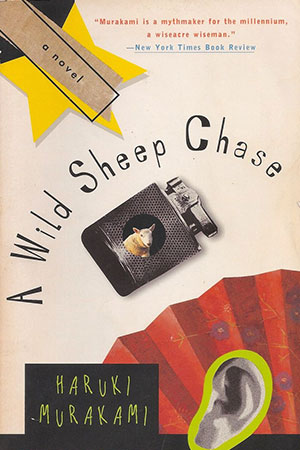The date, a street corner, a person driving a truck, a pedestrian, a casualty, an investigation of possible negligence.
Sounded like one of those poems on the inner flap of a magazine.
“Where’s the funeral?” I asked.
“You got me,” he said. “Did she even have family?”
Of course she had a family.
I called the police department to track down her family’s address and telephone number, after which I gave them a call to get details of the funeral.
Her family lived in an old quarter of Tokyo. I got out my map and marked the block in red. There were subway and train and bus lines everywhere, overlapping like some misshapen spiderweb, the whole area a maze of narrow streets and drainage canals.
The day of the funeral, I took a streetcar from Waseda. I got off near the end of the line. The map proved about as helpful as a globe would have been. I ended up buying pack after pack of cigarettes, asking directions each time.
It was a wood-frame house with a brown board fence around it. A small yard, with an abandoned ceramic brazier filled with standing rainwater. The ground was dark and damp.
She’d left home when she was sixteen. Which may have been reason why the funeral was so somber. Only family present, nearly everyone older. It was presided over by her older brother, barely thirty, or maybe it was her brother-in-law.
Her father, a shortish man in his mid-fifties, wore a black armband of mourning. He stood by the entrance and scarcely moved. Reminded me of a street washed clean after a downpour.
On leaving, I lowered my head in silence, and he lowered his head in return, without a word.
I met her in autumn nine years ago, when I was twenty and she was seventeen.
There was a small coffee shop near the university where I hung out with friends. It wasn’t much of anything, but it offered certain constants: hard rock and bad coffee.
She’d always be sitting in the same spot, elbows planted on the table, reading. With her glasses—which resembled orthodontia—and skinny hands, she seemed somehow endearing. Always her coffee would be cold, always her ashtray full of cigarette butts.
The only thing that changed was the book. One time it’d be Mickey Spillane, another time Kenzaburo Oe, another time Allen Ginsberg. Didn’t matter what it was, as long as it was a book. The students who drifted in and out of the place would lend her books, and she’d read them clean through, cover to cover. Devour them, like so many ears of corn. In those days, people lent out books as a matter of course, so she never wanted for anything to read.
